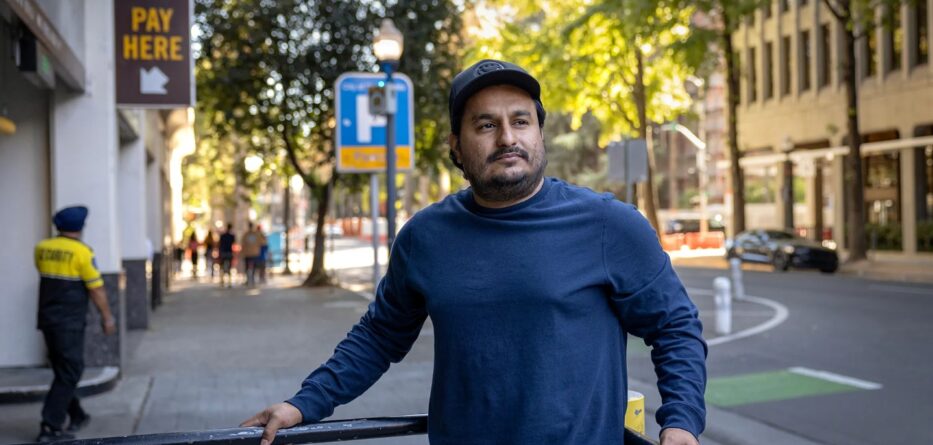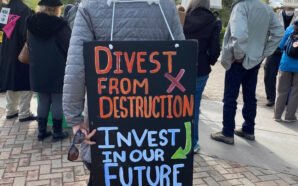Justo Robles
CalMatters
In the final hours of Sept. 15, 2022, Pablo Silva and four other Venezuelan men were wandering downtown Sacramento, a city they had never heard of, searching for a roof over their heads.
They didn’t find it.
They had traveled thousands of miles to escape violence and poverty in Venezuela. Silva said he and the men had asked for asylum at the border in Texas and, after they were processed, immigration officials gave them paperwork with an address, saying it was a shelter in Sacramento.
To this day, Silva isn’t sure who bought his ticket to California, but penniless and hungry he accepted, expecting a better future in the state capital.
After hours of walking in Sacramento, Silva spotted the address — 1107 9th St. — and imagined himself sleeping in a warm bed inside the tall building.
But a security guard there stopped him and the other men before they could knock and said, with the help of Google Translate, that there was no shelter in the Forum Building, a 10-story edifice that houses offices for lobbyists, two blocks from the Capitol.
The five immigrants, who barely knew each other, searched all night for a warm place to rest. At times they slept on the ground, huddled together on a park bench, and even ducked into portable toilets until the smell of human feces got to them.
A year later Silva still lives in Sacramento. Recently he retraced his steps from that night, telling his story of leaving his family in Venezuela, seeing the bodies of those who didn’t survive their journey to the United States, and almost giving up during that first night of sleeping on Sacramento’s streets.
“When I arrived here I had nothing,” Silva said, while standing across from the Forum Building on a recent afternoon. “Now I have a work permit, but I haven’t had much luck finding a job. I don’t want to take anybody’s job; I just want an opportunity.”
Silva’s journey foreshadowed a wave of buses and flights transporting asylum seekers from border cities in Texas to metropolitan areas run by Democrats, including Los Angeles and Sacramento. Texas Gov. Greg Abbott and Florida Gov. Ron DeSantis have boasted about the mass migrant movement, though it’s unclear who sent Silva’s group to Sacramento.
Silva has made progress launching his new life, he said; though he still encounters setbacks. Like Silva, many of the dozens of asylum seekers landing into California are hoping to find work and a safe haven.
They may find that it takes a while, Silva said.
An unexpected journey to California
Silva said he was forced to leave his family and native country after refusing to join the National Liberation Army, a Marxist guerrilla group in Colombia that operates near the Venezuelan border, including in his hometown of Ureña.
Silva had heard from other Venezuelans who emigrated that the United States is a safe country filled with opportunities. On Aug. 7, 2022, Silva said goodbye to his 7-year-old daughter and, with the equivalent of $80 in his pocket, embarked on a journey north.
First he traveled by bus and boat until he reached the mountains of the infamous Darién Gap, a once-impenetrable rainforest connecting Panama with South America. It has become a major crossing point for U.S.-bound migrants.
Some don’t make it through, Silva said, describing the eight days it took him to cross the jungle.
“I saw dead women, men and children laying on the ground,” he said. “I went four days without eating, and drinking water from the river.”
Silva traversed Panama, Costa Rica, Nicaragua, Honduras and El Salvador on foot and by bus. When he reached Guatemala City, he asked strangers for money until a man helped him buy a bus ticket to the Mexican border. Silva then rode the final 100 miles atop the notorious freight train known as La Bestia to Piedras Negras, a border town across from Eagle Pass, Texas.
The United Nation’s chief immigration agency has deemed the U.S.-Mexico border the world’s deadliest land route for migrants. Last year at least 686 people died or disappeared, nearly half in Mexico’s Sonoran and Chihuahuan Deserts.
On Sept. 8, 2022, Silva swam across the Rio Grande and surrendered to U.S. immigration officials. He spent his first night inside a Border Patrol cell, colloquially known as a hielera, or ice box, due to its cold temperatures, before being transported to a church in El Paso.
There, Silva said, he was given documents instructing him to check in with Immigration and Customs Enforcement (ICE) officials in Sacramento. He also was given paperwork that included the address that was supposed to be a shelter in California’s capital.
Silva and a group of other migrants hitchhiked about 550 miles to the Migrant Resource Center in San Antonio, where he was told to board a flight to California.
“I thought I was finally going to a safe place,” Silva said. “But that happiness turned to nothing not long after we arrived. I realized that my journey hadn’t ended yet.”
Barricades as blankets
That security guard at the Forum Building advised Silva and the other four immigrants to come back early the next morning for more information.
Disappointed, they walked in circles looking for a place to eat and something to drink. It was near midnight and they could find nothing open. Every minute that went by they grew more hungry and thirsty. Headaches started to kick in.
When Silva saw a Sacramento police vehicle, hope manifested itself, he said.
“We showed our paperwork to a police officer and he called (on) his radio,” he said. “More officers came and they were speaking English to each other. He then approached us and said, ‘I am sorry, this is not our obligation.’”
The Sacramento Police Department didn’t respond to requests for comment about that encounter.
To fight the cold, the men sat close to each other on a metal bench at Cesar Chavez Plaza, a small park near Sacramento’s city hall. Not far from there, dozens of people were sleeping on the ground. Silva cried in silence.
Unable to sleep, the migrants kept walking until they were outside California’s Capitol. They decided to go inside some porta potties to warm up. But the smell was unbearable and they left.
As Silva continued walking, he thought of his weeks-long trek across a jungle and several countries. It helped him stay focused and motivated, though he could feel the blisters on his feet with every step.
Around the corner from the Capitol, the five men succumbed to fatigue. They entered a parking garage and laid down near a wall, using nearby barricades as blankets. Silva said he didn’t get any sleep, wondering how and why he had ended up on the streets.
A few hours later, at 6 a.m. the five men headed back to the Forum Building, where the same security guard provided them with an address seven miles away. It was a food bank, where they were welcomed with breakfast and introduced to NorCal Resist, an immigration advocacy organization in Sacramento.
NorCal Resist said it would pay for their housing, food, and certain living expenses for six months.
“We make that agreement kind of knowing that we will probably have to provide assistance for a longer period because it takes a long time to get financially stable,” said Autumn Gonzalez, a volunteer attorney at NorCal Resist. “But these guys have been amazing. They went out hustling to find work immediately.”
Without proof of income or a credit history, they couldn’t rent a place to live, so Silva and the other immigrants were placed in a hotel. Gonzalez said her group has helped other migrants like them who arrive in Sacramento without friends or family to help.
“The first thing I did was to shower. I wanted to feel like myself again,” Silva said, showing the faded jeans he wore during his journey to the U.S.
“NorCal brought us new clothes and I tried them on. It felt like a new beginning.”
After a few months in the hotel, NorCal Resist helped Silva move to a two-bedroom apartment, which he now shares with two other immigrants seeking asylum.
Long journey for daily work
Without a work permit from the federal government, undocumented immigrants are not allowed to hold down jobs. Many wait six months or more after applying for asylum to qualify for a work permit. Until then, many find temporary or day work and are paid under the table.
Silva heard that if he showed up early in the morning at a Home Depot, he may be picked up for construction jobs. He rode a donated bike for 25 minutes in the predawn darkness to get there. His daughter needed to eat, he reminded himself. An hour before sunrise, Silva stood waiting to get picked up.
“I will never forget this American woman who didn’t speak Spanish but wanted people to help her move,” Silva said.
“I worked almost eight hours and got paid $200. That was my first job and the last for a few days.”
In the following months, Silva took daily jobs in construction and gardening, sometimes traveling to Modesto, Stockton and as far as Reno, Nevada. Some nights Silva skipped dinner to save every dollar he could for his daughter in Venezuela.
A man he met outside Home Depot helped him get steadier work at a carpet installation company. Though he gets paid $140 for a day shift that sometimes exceeds eight hours, Silva doesn’t always get five shifts a week, he said. In recent months he’s had to borrow to make ends meet and pay rent.
Just before his one-year anniversary in Sacramento, Silva experienced an anxiety attack and was rushed to the hospital.
His mental health had been deteriorating, he said. His eldest sister had died in April. His mother could not afford medication following her surgery. And he worried about his legal status.
“I remember I couldn’t move my face and my fingers,” Silva said of the panic attack. “I went back to work a couple of days after. I can’t take days off; I need to be able to provide for my family.”
A future still uncertain
When Silva claimed asylum, saying he fled harm in Venezuela, U.S. Customs and Border Protection agents processed him and released him pending adjudication of his case. Instead of giving him a court hearing, agents instructed Silva to check in with ICE as part of a process designed to alleviate overcrowding in border facilities.
Soon after he connected with NorCal Resist, the group helped him file his official asylum application, starting the clock to obtain work authorization.
Getting a work permit has nothing to do with whether or not your asylum case is likely to be approved, said Theresa Cardinal Brown, a former immigration official under Presidents Barack Obama and George W. Bush.
Ultimately an immigration judge and asylum officers must find that a migrant was persecuted or could be persecuted in their home countries due to one of several factors, such as their political views or religion, in order to grant them asylum. Those who lose their asylum case face deportation.
Migrants are waiting years to get their cases heard because of backlogs. As of December, more than 1.5 million asylum seekers were awaiting asylum hearings, according to the Transactional Records Access Clearinghouse at Syracuse University.
“To get a resolution, to get either approved or rejected, depends on where the immigration court hearing is. It could be anywhere from a year to five years, or longer,” said Cardinal Brown, now a senior adviser at the Bipartisan Policy Center in Washington, D.C.
U.S. border officials have reported record levels of migrant apprehensions in recent years, including 2.2 million in fiscal 2022. Along with posing humanitarian and operational challenges, the unprecedented migrant influx has ignited a political battle between Republican state governors, President Joe Biden and Democratic-led cities.
At Abbott’s direction, Texas has bused hundreds of migrants to large cities across the United States — including more than five hundred to California since June — to protest the Biden administration’s border strategy and local sanctuary policies.
And the Florida Division of Emergency Management said it was responsible for flying a group of thirty-six migrants to Sacramento in June.
Neither Abbott nor DeSantis took credit for the flight that sent Silva to Sacramento.
Lauren Heidbrink, an associate professor and anthropologist at Cal State Long Beach who focuses on migration, said that by paying to ship migrants out of Texas, Abbott “is enlisting taxpayer dollars to create a political spectacle. He’s fabricating a crisis where there is none.”
There have been reports that Texas officials listed migrants’ addresses incorrectly on official documents, confiscated their documents and never returned them, and deceived migrants to get on buses to places where they have no contacts.
These practices can hinder migrants’ ability to attend their assigned court hearings and comply with immigration proceedings, Heidbrink said.
“It’s potentially creating chaos within the immigration system that’s trying to ensure that people get their day in court,” she said.
State officials have said California has assisted 423,000 immigrants since April 2021 and spent $1.3 billion since 2019, helping the federal government provide humanitarian services to new arrivals at the border.
Gonzalez said NorCal Resist is still unsure about who bought the plane tickets for Silva and the other four men last year. She added that, in some cases, shelters or nonprofits will pay for transportation for migrants being processed at the border, if they request it but have no money to continue their travels in the United States.
Permission to work
In the early morning of July 15, 10 months after his arrival in Sacramento, Silva opened his mailbox to find a letter from the federal government. Silva jumped with excitement when he realized he had received his work permit, a much sought-after document and a key milestone on his year-long journey that began far from California.
But Silva’s struggles didn’t end there. Not long after he opened the letter, he walked through downtown Sacramento for hours searching for a job. With a work permit, Silva thought that a stable income was finally attainable.
But all the businesses he visited rejected him.
“Some managers said they would call me back and they never did,” Silva said. “But what really hurt me was the discrimination. A manager said my work permit was fake.
“It discouraged me to hear that I had no right to have this kind of documentation.”
But he will keep searching, Silva said; that’s what he has done since he left Venezuela. And as his future in Sacramento remains uncertain, his dreams and goals remain the same.
“I want to start my own business, contribute to this economy,” Silva said with a smile. “And I know I can only do that in a country like the U.S.”
Alejandra Reyes-Velarde at CalMatters contributed to this report.






